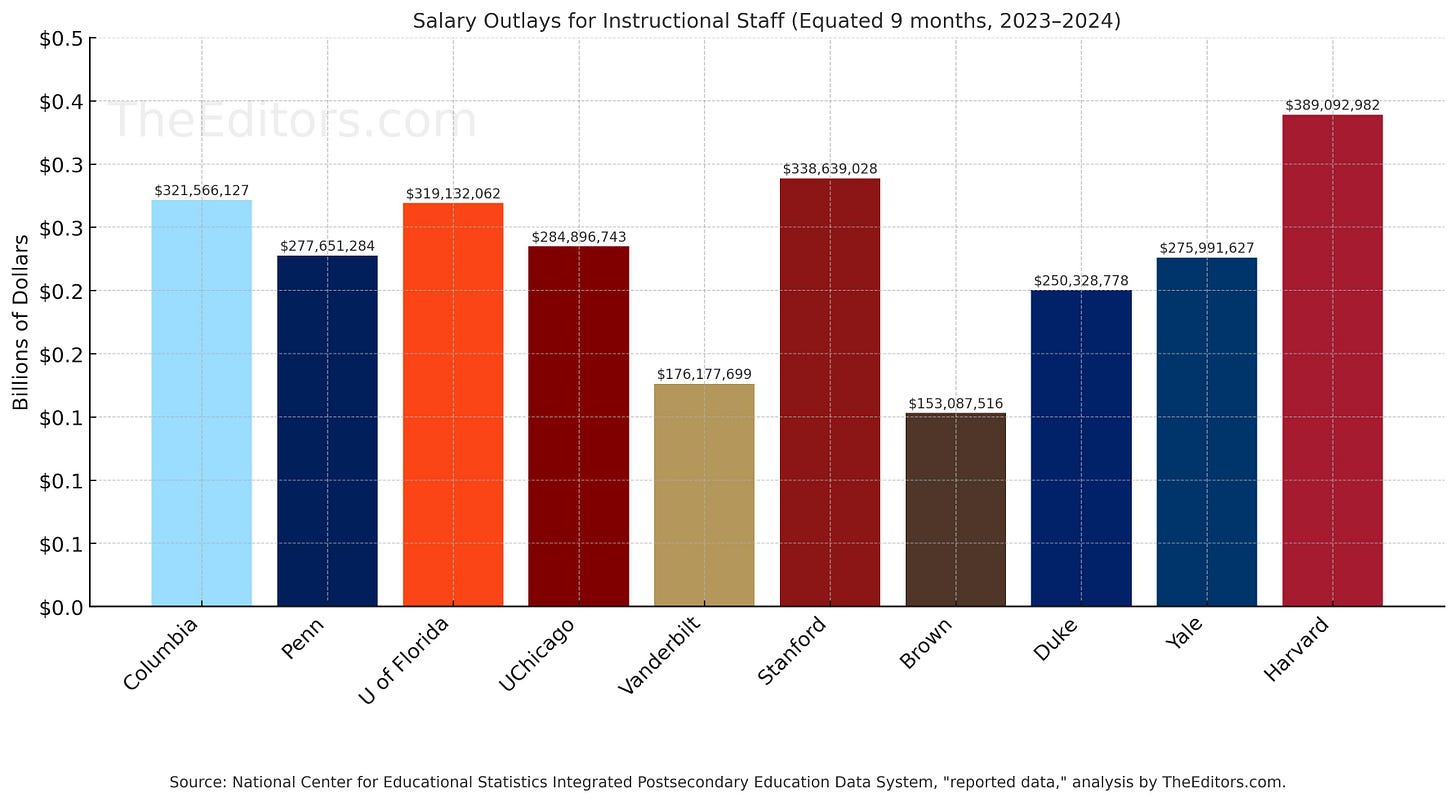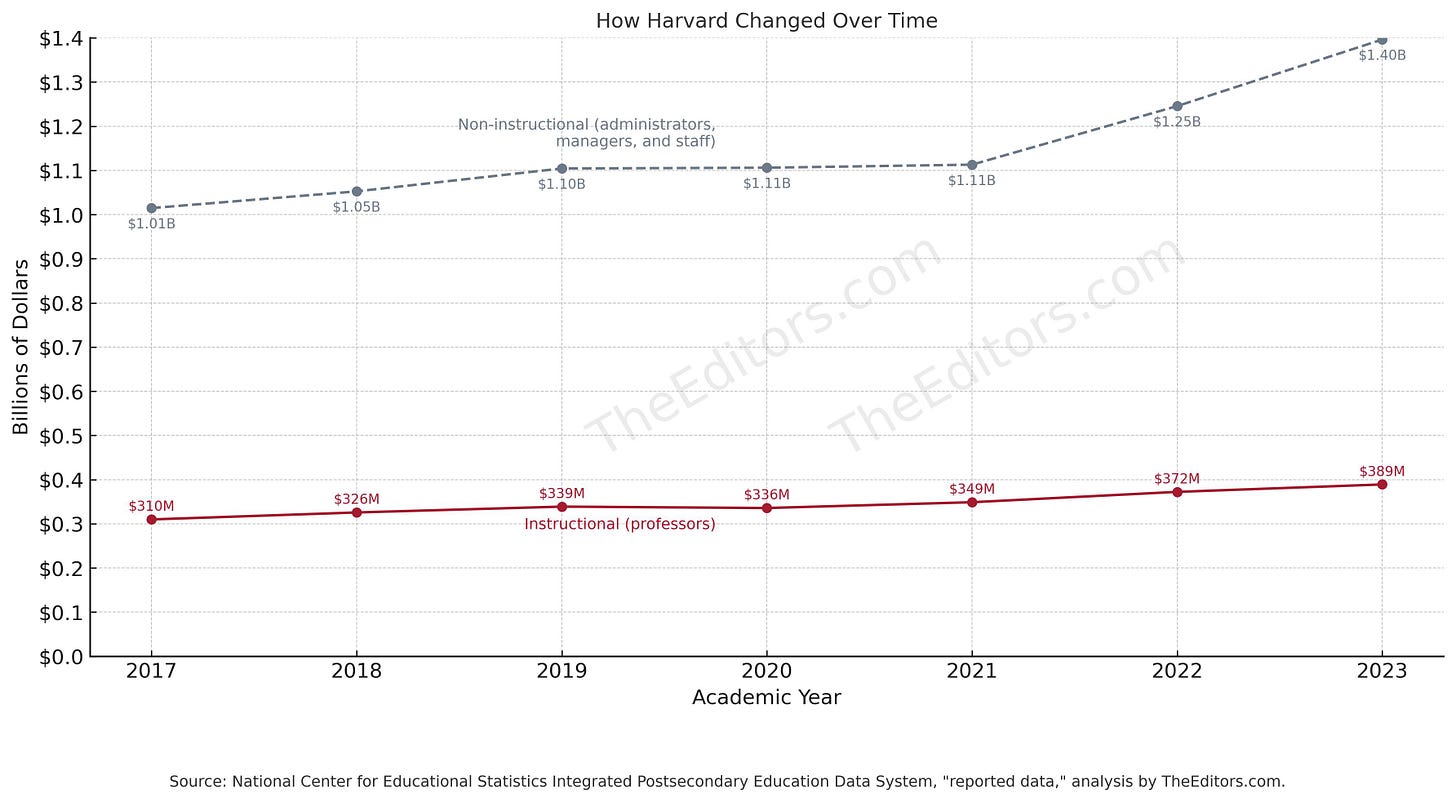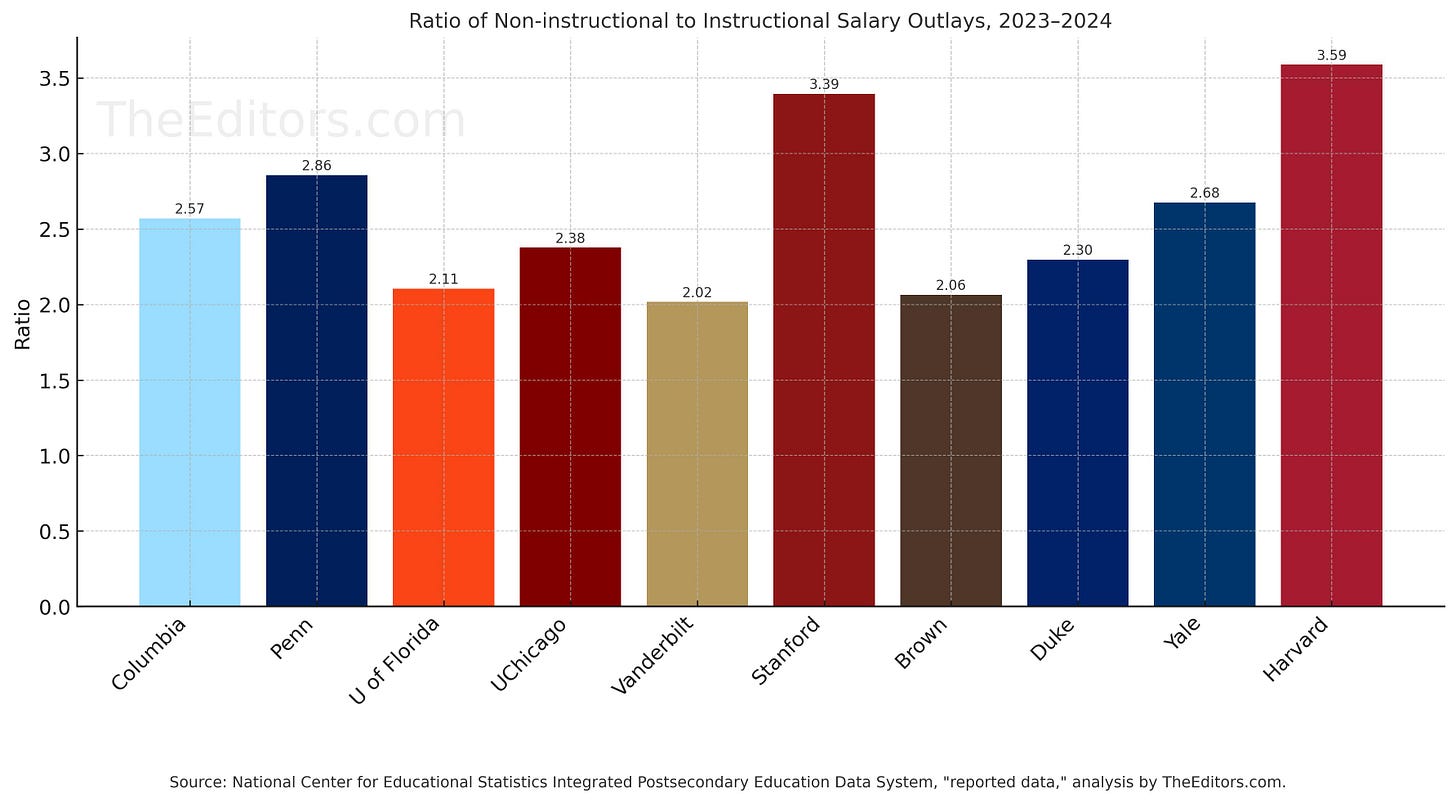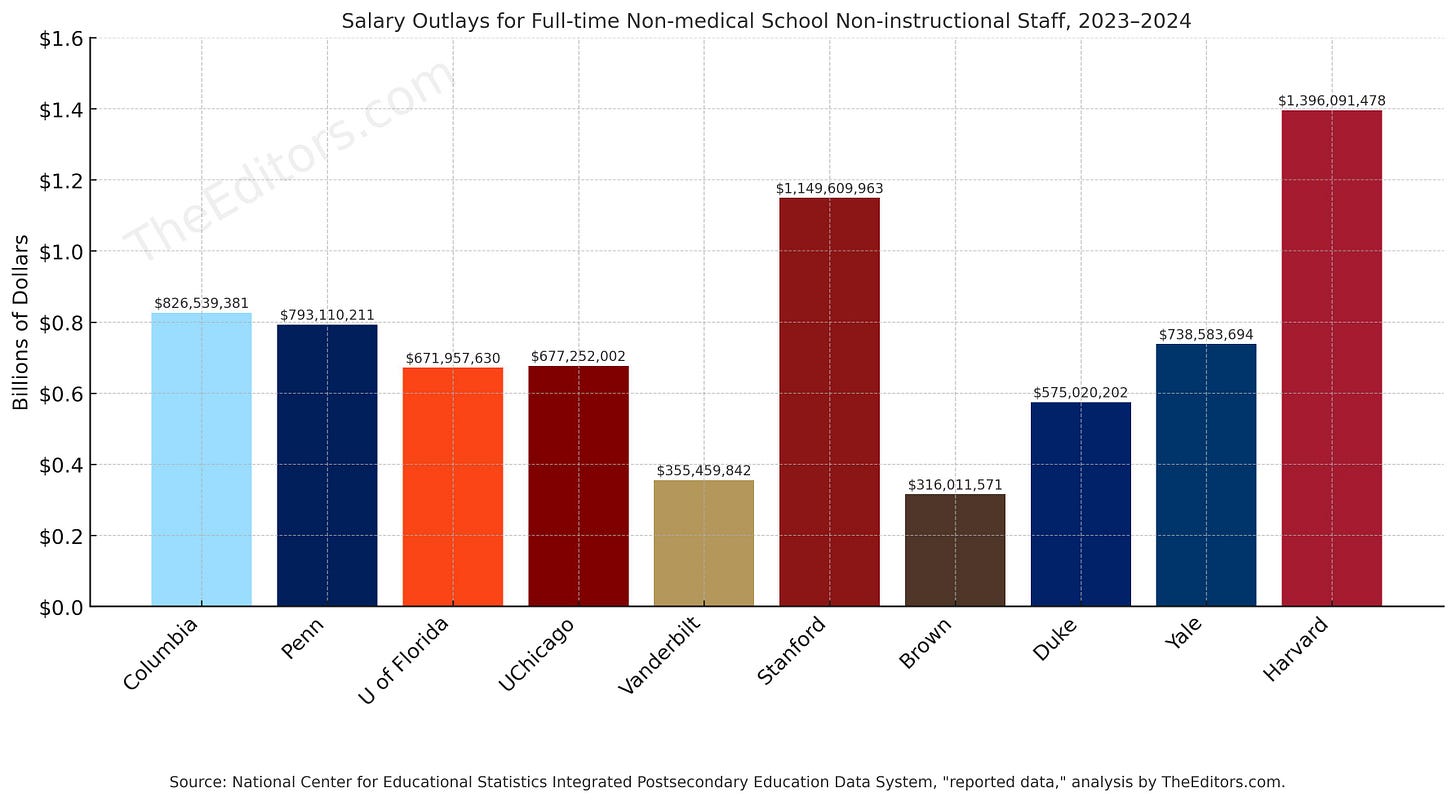Harvard Spends $1.4 Billion a Year on “Non-instructional Staff”
Federal education secretary sees a “bloated bureaucracy.” She has a point.
Harvard is spending about $1.4 billion a year on “Salary Outlays for Full-time Non-medical School Non-instructional Staff,” according to its most recent filing with the federal government, a figure that is about double what Yale and the University of Chicago pay, and more than triple what Harvard devotes to paying professors and other teaching staff.
Since 2017, Harvard’s spending on administrators, clerical and technical workers, and other functionaries included in that “Non-instructional Staff” category has soared by about $400 million, or about 40 percent. Over the same period, spending on professors and other teachers at Harvard grew by about $80 million, or 25 percent. Degree-program enrollment has remained roughly flat, though Harvard has ramped up revenue-generating online and short-term executive-education programs offering non-degree credentials such as certificates.

One of the demands that the federal government made on Harvard in the April 11, 2025 letter that Harvard says triggered its lawsuit was “reducing forms of governance bloat, duplication, or decentralization that interfere with the possibility of the reforms indicated in this letter.” On May 5, 2025, the federal secretary of education, Linda McMahon, wrote in a letter to Harvard President Garber of Harvard’s “disastrous mismanagement” and its “bloated bureaucracy.”
Harvard graduate, donor, and critic Bill Ackman, CEO of Pershing Square, addressed this in his May 6, 2025, appearance on a panel at the Milken Institute, faulting Harvard for what he called its “administrative bloat and inefficiency.”
“Harvard is effectively a fiduciary for the taxpayer dollar, and so when Harvard wastes massive amounts of money on administrative bloat—and, if you talk to any member of the faculty, they’ll tell you, you know, the nightmares they have dealing with the bureaucracy,” Ackman said. “The faculty growth at Harvard has been nominal but the administrative growth at Harvard has been enormous….Why should the federal government be allowing their dollars to be wasted?”
Ackman raised the prospect that Harvard’s talented science faculty members should pick up and “move somewhere else.”
“They should go to Vanderbilt. They’ll go to Duke. They’ll go to Dartmouth,” he said.
Ackman said that instead of suing, Harvard should have replied to the federal government by saying, “you’re right, we need to fix administrative bloat and inefficiency. We need to zero-base budget Harvard, so that we don’t waste a dollar of federal money.”
“This is the best time in history to start a university, because there are a lot of very unhappy faculty at many institutions that are tired of the bureaucracy,” Ackman said.

If Harvard just cut back its bureaucracy to Yale levels, it could save $650 million a year—or roughly what the federal government is threatening to cut in annual research funding. And Yale isn’t exactly lean, either—last month faculty there called for an administrative hiring freeze to counter what they described as “runaway bureaucratic expansion.” Harvard professor Stephen Pinker called that “an idea whose time has come.”

To give but one example, when I arrived at Harvard in 1990, the university did not have a provost. Now it has a provost, a “Vice Provost for Climate and Sustainability,” a “Senior Vice Provost for Faculty Development and Diversity,” a “Vice Provost for Research,” an “Associate Provost for Campus Health and Wellbeing,” an “Associate Provost for Research,” a “Senior Associate Provost, Chief Technology Development Officer,” an “Associate Provost for Arts and Culture,” an “Associate Provost for Student Affairs,” a “Vice Provost for International Affairs,” a “Vice Provost for Special Projects,” a “Vice Provost for Advances in Learning,” and an “Associate Provost for Institutional Research and Analytics.” Some of these people may also teach. Many of these people also have their own staff assistants. The more people like that there are, the more information technology and maintenance people you need to keep their computers running and offices functioning.
And keep in mind that the “Salary Outlays for Full-time Non-medical School Non-instructional Staff” don’t even capture a lot of the money that Harvard spends on contracted-out labor, like security guards from a company called Securitas, the outside landscapers that Harvard brings in to spruce up the campus in advance of Commencement and reunions, or the 16 lawyers from King & Spalding, from Ropes & Gray, from Quinn Emanuel, and from Lehotsky Keller Cohn LLP that are representing Harvard in its suit against the federal government. Harvard has cut back its spending on internal money managers at the Harvard Management Corporation and instead farmed the endowment out to private equity and venture capital managers whose fees aren’t counted as Harvard staff salary outlays. That’s another whole story.
Thank you: Appreciate our coverage of higher education and Harvard? Please sign up as a paying subscriber. For less than 27 cents a day you can help to sustain our editorial independence and assure your full access to all the content. If you are already paying, consider upgrading to a founding membership. We promise we won’t spend the money on hiring lots of bureaucrats.




I used to wonder whether Bill Ackman was reading things I wrote in the Wall Street Journal because he said similar things afterwards. But one time I hadn't yet submitted my text and Ackman said the same thing. I concluded that Ackman and I are just on the same wavelength.
The McMahon letter refers to Ackman as someone who is thinking sensibly about these issues. I agree and suggested to Harvard that it talk directly with Ackman and act proactively. By acting reactively Harvard feeds the notion that it can't be trusted and needs to be micromanaged in order to take the proper actions.
Quoted below is my recent WSJ letter on administrative bloat at Harvard.
https://www.wsj.com/opinion/how-inefficient-is-harvard-administrators-faculty-hillsdale-873e0718
"How Inefficient Is Harvard?
A better way to tell is to look at the ratio of administrators to faculty.
May 2, 2025 2:31 pm ET
Mark Mishler argues that Hillsdale College is more efficient than Harvard University because it has a higher student-to-employee ratio (Letters, April 30). But teaching is only a small part of what goes on at the university. In my years on the faculty of Harvard Medical School, I spent less than 1% of my time teaching students about neural network programming, epilepsy, neuroscience and supervising residents in neurology. I spent roughly 75% of it doing research, 10% on seeing patients and the rest on writing grant proposals and serving on the institutional review board for research.
A better metric for inefficiency is the ratio of administrators to faculty, which has ballooned in recent decades thanks to governmental regulations and social engineering. Reducing that, and streamlining the process for applying for grants, is where bloat can best be mitigated."